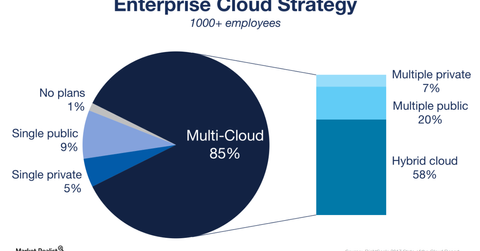IBM Has Ample Space for Growth in Hybrid Cloud Space
Amazon’s AWS (Amazon Web Services), Microsoft Azure, and Google Cloud all include enterprise AI solutions such as translation, NLP (natural language processing), and image recognition.
Nov. 20 2020, Updated 4:46 p.m. ET

Increased investments in AI and ML will keep the cloud a concentrated space
Earlier in the series, we discussed IBM’s (IBM) cloud revenue growth compared to its peers. With the quarterly earnings out for 3Q17, it’s apparent that cloud continues to be dominated by four major players, Amazon (AMZN), Microsoft (MSFT), IBM, and Google (GOOG).
Amazon’s AWS (Amazon Web Services), Microsoft Azure, and Google Cloud all include enterprise AI solutions such as translation, NLP (natural language processing), and image recognition. IBM, through its Watson platform, is trying to sell itself as a prominent AI player. The inclusion of AI into its key cloud computing platforms indicates that these companies see AI as a key growth driver of their cloud offerings. IoT (Internet of Things), AI (artificial intelligence), and ML (machine learning) are the technologies expected to drive the future of the cloud. As a result, investments by the above-mentioned companies will continue to keep the cloud space concentrated among a few players.
Players in cloud space move to hybrid cloud
This trend also highlights a change in the cloud space. Though public cloud adoption is on the rise and offerings in this space are expected to dominate in the near future, as reported by RightScale 2017 State of the Cloud report, there are several factors and constraints that are making companies think twice about their decision to fully embrace the public cloud. Currently, security concerns, limitations, and loopholes in existing infrastructure are discouraging companies from public cloud solutions.
The hybrid cloud offers a combination of features of two or more cloud models: private, community, and public. While providing the control and security of a private cloud, it also has the user-friendliness, versatility, and cost-effectiveness of a public cloud. However, the private cloud is often preferred, as organizations have control over their data even when using hybrid cloud services.
According to RightScale’s 2017 State of the Cloud Report, 85% of respondents said their organizations have multi-cloud strategies compared with 82% in 2016. In 2017, 58% have a hybrid cloud strategy compared with 55% in 2016, as the above presentation shows. This trend explains why dominant players in the cloud space like Amazon, Microsoft, IBM, and Google are constantly expanding their offerings in the hybrid cloud. While expanding and enhancing their cloud offerings, they aren’t just trying to address current public cloud limitations but are also aiming to increase their market share in the competitive and consolidated cloud space.
